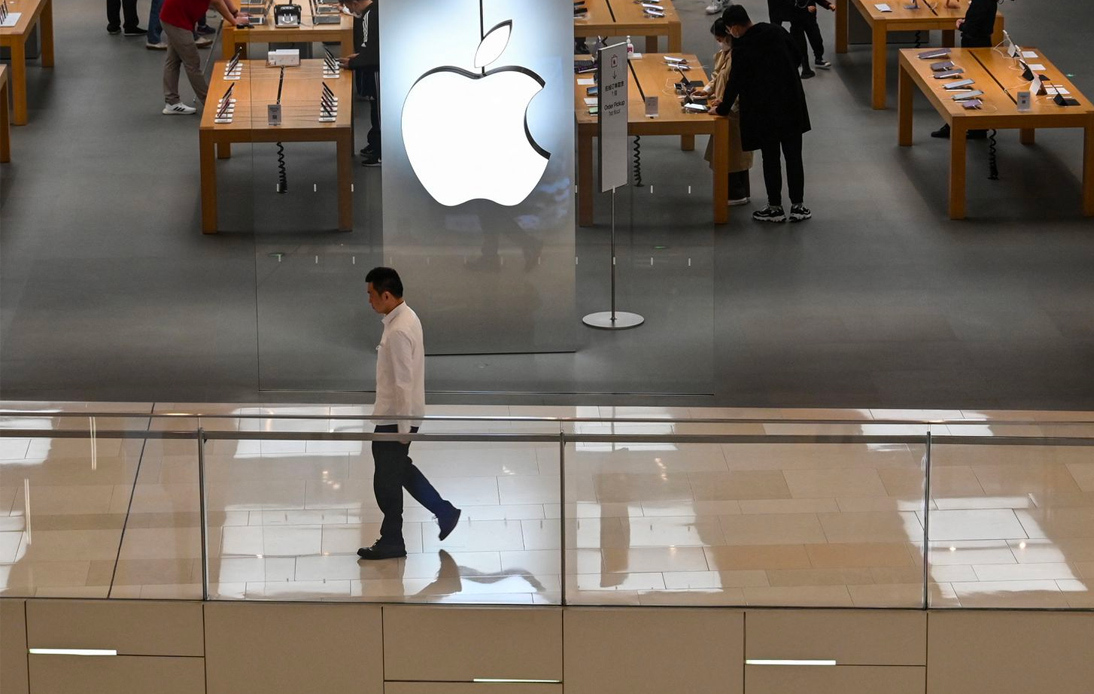
Shares in Apple have experienced a decline for a second consecutive day, spurred by reports of the Chinese government prohibiting its employees from using iPhones.
The company’s stock market valuation has plummeted by over 6%, equivalent to nearly $200bn (£160bn), within the last two days.
China occupies the position of being the tech behemoth’s third significant market, contributing to 18% of its cumulative revenue in the preceding year.
Additionally, it is the primary location where a majority of Apple’s merchandise is manufactured by its biggest supplier Foxconn.
The Wall Street Journal (WSJ) disclosed on a Wednesday that Beijing had commanded central government bureau officers to abstain from bringing iPhones into their workplaces or employing them for occupational tasks.
Subsequently, Bloomberg News noted that the prohibition might extend to personnel at state-run enterprises and government-sponsored organizations.
The mandates to avoid using iPhones were conveyed to the officers by their higher-ups in the preceding weeks, informants revealed to the WSJ. Restrictions were additionally implemented on other international branded devices.
iPhones were previously prohibited in several agencies, according to the paper, but its sources indicate that this ban has now expanded.
The extent of the circulation of these directives among the Chinese bureaucracy remains ambiguous.
The revelations surfaced prior to the unveiling of the iPhone 15, scheduled for the 12th of September.
On the Chinese digital platforms, several individuals claiming to be employees of state-operated firms disclosed receiving notifications to cease the usage of Apple devices by the end of September.
China ranks as one of Apple’s largest markets, with iPhones being manufactured within its borders, although Apple has recently ramped up production in India.
No formal announcement has been made by the Chinese authorities addressing these revelations.
Knock-On Effect
Secondary repercussions Apple boasts the pinnacle position globally in market capitalization, approximating nearly $2.8 trillion.
Coupled with the dip in Apple’s shares, stocks of several of its providers also witnessed a decline.
Qualcomm, globally recognized as the foremost provider of smartphone microchips, saw a reduction exceeding 7% on Thursday, while stakes in South Korea’s SK Hynix were marginally below 4% on Friday.
The tension between the US and China in the technological sector has been escalating continuously, with reciprocal impositions being established.
This year, Washington, in collaboration with its allies Japan and the Netherlands, restricted China’s access to some chip technology.
In a countermove, China constrained the export of two pivotal substances to the semiconductor sector.
Furthermore, Beijing is allegedly orchestrating a fresh $40bn investment fund to foster its semiconductor manufacturing sector.
In the previous week, amid the visit of US Commerce Secretary Gina Raimondo to Beijing, the Chinese technological powerhouse Huawei unexpectedly showcased its Mate 60 Pro mobile device.
On Friday, the firm initiated the presales for the Pro+ version of the handset.
The Canada-based tech research establishment, TechInsights, acknowledged that the device integrates a fresh 5G Kirin 9000s chipset, created for Huawei by China’s premier contract chip manufacturer SMIC.
TechInsights expert Dan Hutcheson emphasized that it “exemplifies the technological advancements China’s semiconductor sector has managed to achieve”.
This represents a “major technological milestone for China,” the investment corporation Jefferies remarked in an analytical document.
This week, US representative Mike Gallagher, the head of the House of Representatives committee on China, urged the Commerce Department to intensify restrictions on exports to Huawei and SMIC.
Safety modification Conversely, on Thursday, Apple dispatched an urgent software modification for a broad spectrum of past and contemporary gadgets following the identification of a security breach exploited by unidentified hackers.
The update was issued in the wake of Citizen Lab’s digital rights investigators uncovering assailants compromising specific Apple devices through a new and unprecedented method.
Apple independently identified a similar “exploit” and thus released both patches as a component of a swift security response for its users.
This marks the 15th instance this year where Apple has had to roll out comprehensive security updates.





















